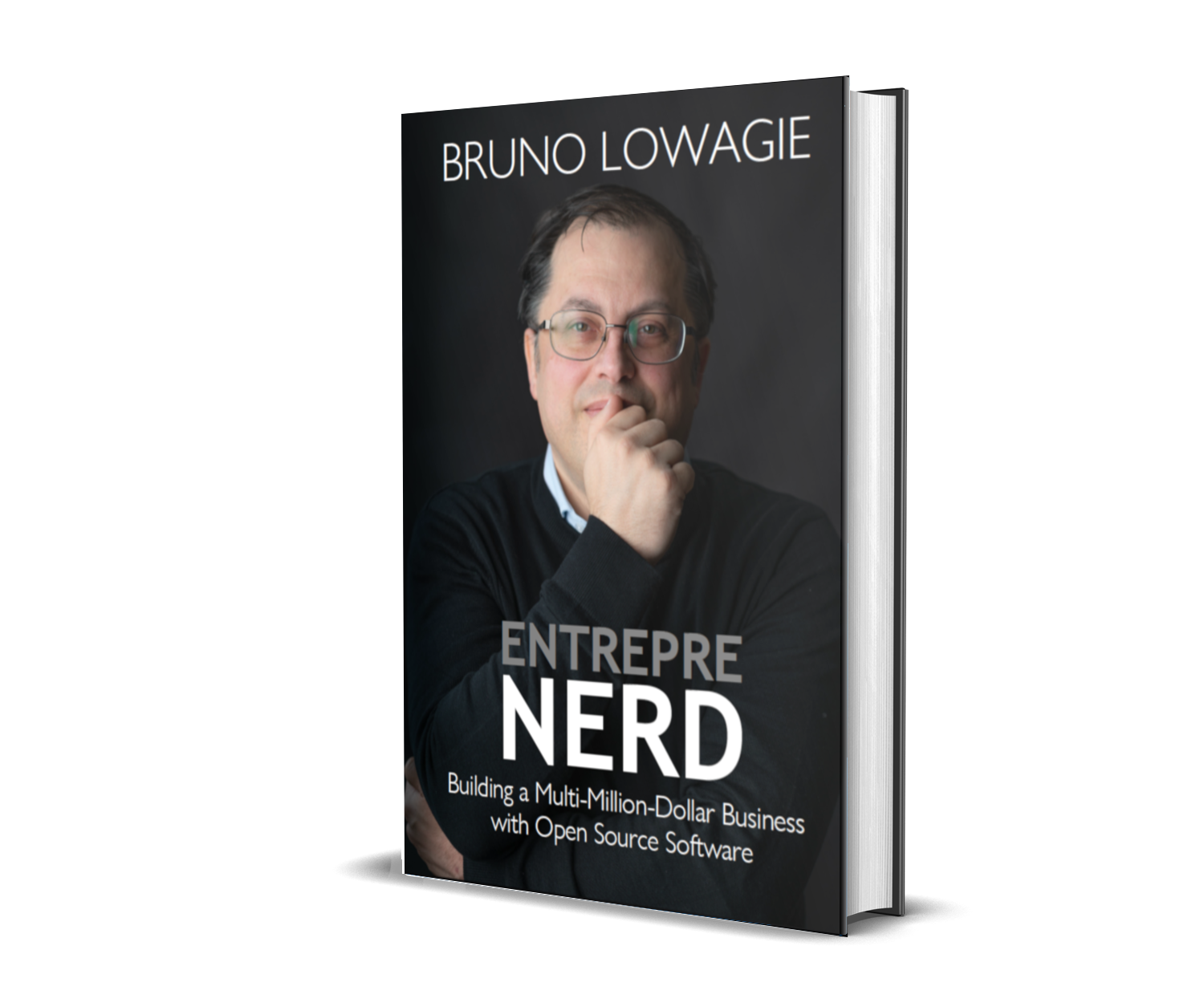0000-07-03
Option 4: The Risk-averseness of Publishers of Technical Books
My book Entreprenerd is primarily a business book, but it's also about building a technology business with open source software. I look at the books published by a handful of publishers of books for developers, I noticed that most of them had a small section with business books. Why not try to publish my book with such a publisher?
On September 18, the day before I started my search for a literary agent, I contacted Michael Stephens, the Associate Publisher at my former publisher, Manning Publications. I told him that I had written a business book, and I asked him for advice on how to proceed. Since my book was about building a business, not building software, I didn't expect him to show any interest in the book. I was surprised when he replied: "We might also consider publishing it. The ToC, while generally interesting as a business book, still has a tech-oriented appeal."
When you browse the catalog of books published by Manning, you won't find many business books. If Manning decided to publish my new book, they would be making an exception. I shared an early version of the full manuscript with Michael, explaining that I would let the manuscript rest for at least two months after which I would touch base with him again. In the next review rounds, I intended to "kill some darlings." That's easier to achieve if there's some distance —read: time— between myself and what I wrote.
I used those two months mainly to find a literary agent or a business book publisher as you could read in the previous parts of this guide. When it became clear that my efforts wouldn't amount to anything, Michael's reply started making more and more sense. My book isn't technical, but a large part of my target audience consists of technical people who dream of building their own business. It might not be a bad idea to present such a book to an audience of publishers of technical books.
I looked at the web sites of two other publishers competing with Manning Publications, and I discovered that they already explored this idea.
I had met people from Apress in India during the Great Indian Developer Summit, and I used that angle to contact Shivangi Ramachandran who is responsible for the business book proposals at Apress. I received a quick reply, informing me that I would receive an answer within a week. When three weeks passed, I sent a gentle reminder.
I received an immediate reply: "Apologies for the delay – we’ve received an influx of proposals in the last few weeks that we’re reviewing. While we would love to work with you on a book, this one may not be a good fit for Apress. We try to publish practical books, and this one seems to be a recount/memoir of your experiences. We don’t publish many first-person stories; so, while this is interesting, we might not be the best team to bring your idea to fruition. I appreciate all the effort that has gone into this proposal. I think the book is strong, and may fit another publisher’s list better than ours. If you have another book ideas that you think could fit Apress, I would love to discuss them further with you."
These are nice words, despite the verdict being negative. The argument not to publish, makes sense. I fully understand the decision.
Pragmatic Publishers was recommended to me by the CEO of Saltmarch, Dilip Thomas. Dilip had read a couple of sample chapters and he wrote: "The material you shared from your book makes for a great read and also a bit heartbreaking to know that, while you achieved professional and commercial success, your having to leave the company was a sad affair. Being an entrepreneur is a lonely and stressful experience. Even more so, when you run it together as a family as Indu and I have realized. I would assume your book would make for an insightful read for wannabe and budding entrepreneurs, so they are better aware of the pitfalls of bringing investors on board. In short, it is a difficult thing to navigate and hearing lessons learnt by experience very much helps."
I submitted a proposal, and within two days I was informed that the proposal would be presented to a committee, but also that Pragmatic Publishers usually doesn't publish books like the one I proposed.
I talked about this feedback with Andrew Binstock, former Editor-in-Chief at Dr. Dobb's Journal and Oracle's Java Magazine. He told me that he knew the Publisher, and he was kind enough to write a review for the committee: "Bruno offers a detailed account of how he built his company from an FOSS package (iText--the Java PDF library) into a company that, at the time he sold it, had 30+ employees and offices on three continents —and was entirely self-funded. Not a penny of VC money or angel investment. What makes this book different from others —and why I like the manuscript— is that instead of dispensing advice like a thousand other books do, it actually discusses the constant navigation of small decisions that an entrepreneur has to make to go from a free product to a thriving, sellable business. It gives a developer a sort of over-the-shoulder look at the building of a company (including the mistakes and false starts). The second reason I like it is that it describes an attainable success. Everyone wants to found a unicorn, but for every unicorn, there are dozens of smaller businesses that successfully grow and are sold. This book describes the path to that success. And because it didn't rely on VC money, it presents a progression that many developers will understand."
I couldn't have described my book in a better way. Alas, despite this excellent review, Pragmatic Publishers replied (15 days after the proposal was submitted): "While the story of iText was interesting to the committee, they did not feel that The Pragmatic Bookshelf was the right place for your story. Even with the practical nuggets of wisdom offered, it is not typical of what we publish. The committee was concerned that we wouldn't be able to deliver the size of audience that either you or we would be happy with."
Again, I fully understood this response, despite—or maybe even because—they already published a book with the title Forge Your Future with Open Source: Build Your Skills. Build Your Network. Build the Future of Technology that seems to cover a similar topic, although I focus more on the business skills, and not on the software development skills.
In the week of Thanksgiving, I pinged Michael Stephens at Manning, and I received his answer December 3, 2020:
"After long conversations, we've concluded that we should not pursue publishing it. This is no reflection on the book itself and more a question of whether we would be able to successfully sell it. The conclusion was that we do not have the right “network” in place to give the book the distribution and marketing support it would need beyond a purely technical channel.
On the positive side, we really like the title and the premise of the book. There’s a universal appeal to the idea of unexpectedly finding yourself in the position of going from technologist to business person, especially as the stakes increase as they do in your story. I’d encourage you to look for a publisher with stronger confessions to the business publishing world.
I’ve enjoyed reading the book and reconnecting with you, and I wish you the best in finding a good home for it."
My conclusion was that it would be too much of a risk for publishers of technical books to publish a book about the metamorphosis of a developer into an entrepreneur, sharing the experience and the vocabulary that was acquired on this life-changing journey. As I had already searched for "a publisher with stronger confessions to the business publishing world" and as I didn't have any success finding one, I decided I was going to self-publish.
Option 3: The Lack of Respect from Business Publishers Option 5: Creating Your Own Self-Publishing Team




